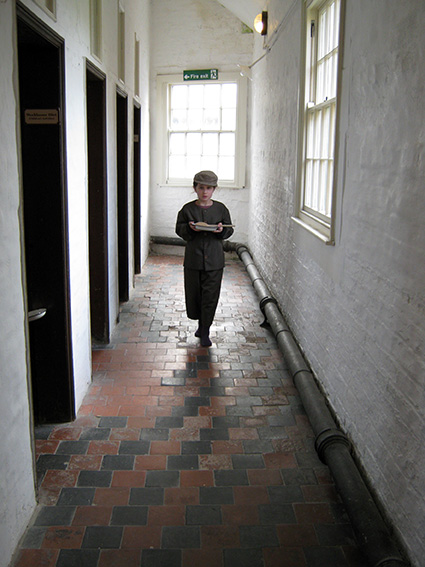Dr Paul Carter is ‘co-investigator’ in a research project that explores thousands of pauper letters to uncover the doubts, concerns and fears of the poor.
In the middle of January 1859, Joseph Fletcher, wrote from 2, Slaters Yard, near Foss Bridge, Walmgate in York, to the “Poor Law Board [Board]” in London.[1] Joseph described himself as “a Working man [with] not much to stir on”. He informed the Poor Law Board that he had “now been out of employ for some weeks past and have had no Assistance from any one, and would be very glad to do without entirely if I could, but I find I am unable to do so any longer”.
However, Fletcher was writing to the Board not for relief [money] but for advice. He told the Board that his reason for writing was that Hannah, his eldest child, was paralysed.[2]
He continued that “she was Born in that State, and has no use whatever of herself she cannot talk nor anything, and is likely to be a burden as long as she lives.”
Fletcher asked for advice on the matter before seeking to talk to the local York Poor Law Guardians. Because of the family’s poverty he had decided to ask the local guardians for some help for her. He asked the central Board in London if the local Guardians in York “can take her from me, I have not yet applied to them nor do I intend until I have your Advice on the subject, as I am willing to do what I can for her”He concludes by asking whether he needed to apply on behalf of himself or the child.
This letter, by one of the millions of 19th century paupers, allows us to think about the New Poor Law, the Victorian system of welfare across England and Wales, not from the viewpoint of the legislators or the central or local administrators, but from the standpoint of the poor themselves. The New Poor Law archive overall is immense and is chiefly written by legislators and administrators. Joseph Fletcher’s letter is part of the archive written by those on the receiving end of 19th century welfare.
There is very little written about the 19th century poor from sources which the poor themselves created. There is good reason for this. The 19th century poor tended not to create their own archive let alone have them selected for permanent preservation and later stored and catalogued by archivists to be called upon by historians. However, a current project has set itself the task of tracking down pauper letters and pursuing a “history from below”.
In Their Own Write is a three-year, AHRC-funded project, running from the beginning of 2018 to the end of 2020, conducted by The National Archives and The University of Leicester. The project focuses on letters from paupers and other poor people, and associated manuscript material such as petitions, sworn statements and advocate letters (those written on behalf of or arguing for paupers) to investigate the everyday experiences of the poor between 1834 and 1900.[3] Such sources give us a different perspective on what it was like to be poor.[4]
In early 1848, Jane Horton wrote from Goodramgate, York, and complained that after she had made an application to the York guardians for relief on account of her “Age and Infirmities” she was not granted outdoor relief but given an order for the workhouse.[5] She was distressed and would have preferred a little allowed to her outside of the workhouse “instead of having to give up my house, as I [have] my Children living in York and they sometimes [call] to see me, but they would be deprived of that privilege if I was in the Workhouse.”
She asked if the local Guardians had the right to compel her to go in the workhouse. Horton cited in mitigation that she was nearly 64 years of age, had suffered a serious burn injury to one of her hands, her husband had died of cholera 15 years earlier leaving her to bring up three children and she had only claimed relief once in her lifetime and then for only a single month.
Letters from the poor often focus on the desire for out relief and a reticence to enter the workhouse. John Melbourne, writing in 1847, claimed he was ill-treated in the Ripon workhouse, by George Bell Jones, the paid overseer.[6] He claimed that “notwithstanding the medical opinion and reluctance on his part that I should be put to break stones this said oppressive and unfeeling man has ordered me for I have been unjustly ordered to enter the house at the age of sixty-four with great infirmities upon me suffering greatly from rheumatics.”
Such complaints were echoed by Henry Bell. In his extended letter written in January 1848, Bell made several claims of abuse and ill-treatment within the York workhouse.[7] He claimed the Guardians neglected their duty in not overseeing or examining the conditions in the workhouse, while the master was reducing the quality and quantity of food and clothing. He charged the master “with unnecessary severity cruelty and recklessness of the well-being and even the lives of the inmates especially of the Patients in the Hospital, denying them a proper quantity of clothing food and fuel in spite of the remonstrances of the Medical Officer, such conduct being calculated to increase the suffering and prolong the disease of the Patients if not actually hasten of even cause their death.”
Bell obviously had knowledge of the various processes with the central poor law authority as he asked for a poor law inspector to investigate, and thus confirm, the accusations he had made. Furthermore, he claimed, “Such is the character of the workhouse on the neighbourhood that it is called ‘Starvation Castle’ and the Hospital attached to it is called ‘The Slaughterhouse’”.
These letters represent a tiny sample of pauper letters we have thus far collected. They speak directly of the doubts, concerns and fears of the poor, while at the same time demonstrating their ability and desire to confront such doubts, concerns and fears, and illustrate their readiness to act upon them. Their letters often set out clearly the issues they wish to address, the solutions they desire and the outcomes they want. Paupers were not some homogenous mass to which things simply happened to; they were actors in history and their actions were recorded in their letters. In Their Own Write will collect, analyse and set its findings within the current debates of poor law history.
Credit
[1] The National Archive (TNA): MH 12/14405, 2512/1859. Joseph Fletcher, York, to the Poor Law Board. 18 January 1859. The image of part of this letter is reproduced courtesy of The National Archives.
[2] Other family data is supplied through the 1861 census entry. TNA RG 9/3552, folio: 68, page: 29. 1861.
[3] https://intheirownwriteblog.com/
[4] The letters referred to here have been fund within the MH 12 record series (Poor Law Union correspondence) held at The National Archives
[5] MH 12/14400, 4931/1848. Jane Harton, York, to the Poor Law Board. 12 February 1848.
[6] MH 12/15632, no paper number, John Melbourne to the to the Poor Law Commission, 11 September 1847.
[7] MH 12 /14405, 6460/1858, Henry Bell, York Union Workhouse, to the Poor Law Board. 18 February 1858. The image of part of this letter is reproduced courtesy of The National Archives.
 Workhouse Museum
Workhouse Museum